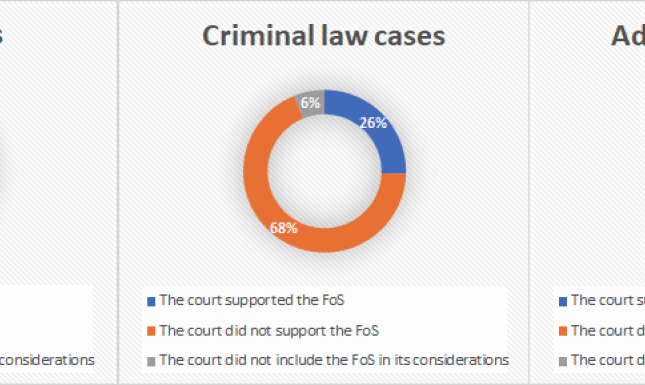Freedom of speech – An invokable right?
Freedom of speech refers to the right to express one's opinion without fear of censorship or repercussions. When and why do courts in the Netherlands decide against it?
During the past few months, the Dutch government prohibited multiple demonstrations. The majority of these demonstrations were directed against the restrictions imposed due to the COVID-19 pandemic. Legitimate or not, this has seemingly put a strain on the constitutional human right to protest and by extension to the freedom of speech. Most people in the Netherlands consider freedom of speech an inalienable right, but is it as inalienable as we would expect in practice? Is it more a theoretical exercise than a right enforceable in court? For our assignment in the PhD and Pre-PhD course Quantitative Empirical Research Methods in Law, taught by Prof. Caminada, we conducted research on the stance of Dutch courts towards the right to freedom of speech. In particular, by studying quantitative data, we wanted to confirm whether the high esteem that Dutch people hold for freedom of speech is reflected in the judgments of Dutch courts.
Freedom of speech in the Netherlands is protected by the Dutch Constitution and the European Convention on Human Rights, to which the Netherlands is a signatory. Dutch courts decide on cases, where parties to legal disputes invoke their right to free speech, whether that right is respected or violated. Whereas they often observe violations of the right, they also acknowledge legitimate limitations, ranging from the protection of reputation in civil law cases, to the expediency of administrative law cases and the protection against offensive slurs in criminal law cases. For the purpose of our research, we collected data on cases decided in criminal, civil and administrative courts during the past twenty years and examined a random representative sample per jurisdiction per year. The results showed an absolute increase in the number of freedom of speech cases, along with a smaller, but significant, relative increase in freedom of speech cases to the total number of cases. Consequently, we observed an increasing number of cases in which parties to court disputes invoke the freedom of speech right and concluded that it has become an important subject, which will continue to gain significance, based on projected trends.
We also found a telling distribution between the times that the court ruled in favour of the party that invoked freedom of speech, the times that the court ruled against it, and the times that the court did not include the freedom of speech claim in its considerations. The figure below shows the differences among the three jurisdictions. (Click to expand)


Notably, in all jurisdictions more often the court did not support the freedom of speech, compared to the times that it did support it, particularly in criminal and administrative law cases. The civil, criminal, and administrative courts show overall to be, 36%, 162% and even 256% respectively more likely not to support the appeal to freedom of speech than to support it, on average over the past twenty years. What the numbers show is that courts rule against the complaints regarding the freedom of speech more often that they rule in favour. This finding contrasted with our initial hypothesis that freedom of speech is supported by courts in the Netherlands, in that courts award in favour of the party that invoked the right more often than against. It also proves that quantitative research in law is essential for the validation of legal arguments, since it is based on numerical evidence that facilitates the direct comparison of primary information, in our case the examined court cases. Aiming to justify this contrast, we extended our research with qualitative data from the background of the examined cases. We found that the difference in the cases that support the freedom of speech right and the cases that do not support it, does not signify a bias on behalf of the courts. This difference can be partly attributed to the fact that there are many cases in which the freedom of speech right was invoked at the expense of other legitimate rights. For example, in defamation cases, several serious allegations were deemed unfounded, hence the court ruled in favour of maintaining the good name of the injured party. In addition, there is a certain amount of cases in which the freedom of speech was used as a ‘hail Mary’, hoping that the court would rule in their favour if the primary arguments failed. The freedom of speech in courts was often not supported due to legitimate limitations of the right and other grounds. One could argue that the limitations of the freedom of speech right are too numerous or loosely formulated, but to draw conclusions from this would require more qualitative research and is likely to be more a matter of politics and opinion.
In sum, results show that violations of freedom of speech have been claimed more frequently in courts of law in the past twenty years, and will likely be increasingly claimed in the future. Nevertheless, we observed that freedom of speech is an invokable right and it is likely to be defended by Dutch courts, when it is invoked lawfully. Especially during these times when the exercise of freedom of speech through protest is being restricted due to public health concerns, it is important to acknowledge the legitimate limitations set on the freedom of speech, both in public affairs and in courts of law. We are nowhere near a dystopia, but keeping track of not only the theory of law but also how it is executed, might just prove to be a sufficient remedy against it.



0 Comments
Add a comment